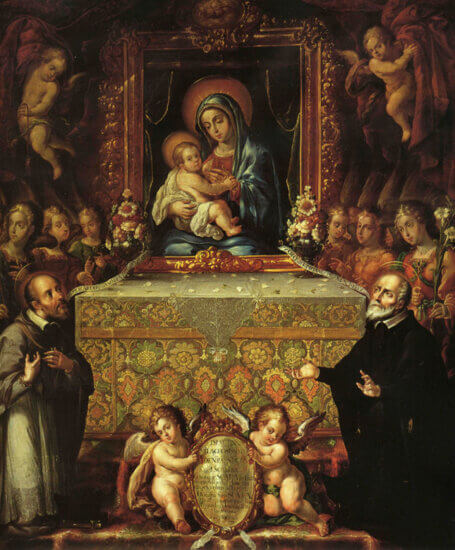Saint Francis de Sales, Cong. Orat.

Historians today cast doubt on whether St Francis de Sales ever met St Philip, but we do know that he loved him. Whilst in Rome St Francis visited often the Vallicella and became friends with the early Fathers of the Oratory, especially Baronius, Gallonio and the Blessed Juvenal Ancina. St Francis was made bishop of Geneva at the same time as Blessed Juvenal was made bishop of Saluzzo and the two maintained their friendship through the exchange of letters. Eventually in 1603 they were able to meet again and Blessed Juvenal invited St Francis to preach. In thanking him for a fervent sermon Blessed Juvenal alluded to the name de Sales — “Vere tu es Sal — Truly, you are the Salt”; and Francis, to the name of the diocese of which Juvenal was bishop (Saluzzo), answered him: “Immo tu es Sal et Lux. Ego vere neque sal neque lux — On the contrary, you are salt and light, while I am neither salt nor light”. That is a charming little window into the spirit of humility shared by St Francis and the Oratory, and a testament to his friendship with our early Fathers.
This should come as no surprise, because St Francis was himself an Oratorian and a loving son of St Philip. This is not a fact that is made much of, but that is of course a very Oratorian thing to do. Inspired by his experiences of the Fathers in Rome and faced with the enormous task of calling the people of the Chablais away from Protestantism and back to the Church, St Francis founded an Oratory in Thonon. His plan was that this “Holy House” would provide a base for the Oratorian Fathers to concentrate on the sanctification of the local people especially through the worthy and solemn celebration of the liturgy of the Church. In September 1599 Pope Clement VIII erected the Oratory of Thonon with St Francis as its provost and approved their Rule, modelled on that of the Roman Oratory, and providing Baronius as the special protector of the house. It was a hard beginning because Thonon was a poor Oratory, but St Francis set to work establishing it as a school of prayer and virtue. He hoped that Blessed Juvenal would be allowed to join him, but it was not to be. In 1603 St Francis was called to rule the diocese of Geneva alone and thus to leave the Oratory — but his letters make clear that he would have preferred to have stayed. It was not easy to replace St Francis as provost and so in 1606 the pope made him provost of the Thonon Oratory again — not an easy task to achieve from afar and together with all his labours in the diocese.
Ultimately the Thonon Oratory did not last — through poverty and scarcity of devoted members. St Francis tried desperately to keep it — even trying to convince Cardinal Bérulle to include in his new French Oratory. Right up until his death in 1622 St Francis was trying to save his Oratory, but to no avail. If one goes to Thonon today one can see the basilica of St Francis de Sales and on its façade a mosaic of his beloved St Philip. The greatest testimony however to the Oratorian spirit of St Francis is his writings and his school of spirituality. Who else but a son of St Philip could remind us “that you can attract more flies with a spoonful of honey than with a whole jar of vinegar” and thus insist upon kindness, sweetness and real love when calling people to Our Lord?
“Be who you are and be that well…” St Francis exhorts us. Let us ask his prayers that we may be true sons and friends of St Philip as he was “…so as to bring honour to the Master Craftsman whose handiwork you are.”
This week’s ‘mid-week’ reflection is a bit early, to share with you one of our Oratorian saints. There will be Solemn Benediction in honour of St Francis de Sales after the evening Mass today.
These reflections are usually sent out each Wednesday to all those on our mailing list. Click here to sign up to our mailing list, and receive our Sunday E-newsletter and these reflections straight to your inbox.

